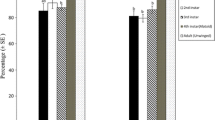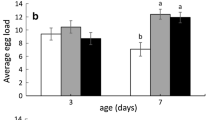Abstract
Dendrocerus carpenteri (Curtis) (Hymenoptera: Megaspilidae) is a solitary hyperparasitoid, which attacks prepupal and pupal stages of hymenopteran parasitoids inside mummified aphids. The larva feeds externally on the host, which is envenomed by the female at oviposition. To evaluate the influence of variations in host quality on the growth, development and fitness of D. carpenteri, we varied the size and developmental stage of the primary parasitoid host (Aphidius ervi Haliday), which was reared on different instars of pea aphid [Acyrthosiphon pisum (Harris)] and English grain aphid [Sitobion avenae (F.)]. Within each kind of host, females eclosed from the relatively larger mummies, while males eclosed from the smaller mummies. Host size and hyperparasitoid size were correlated, and females were larger than males. In hyperparasitoids developing on prepupal and pupal hosts, development time from oviposition to adult eclosion was proportional to size; females required more time for development than males. The mean relative growth rate was the same in males and females and increased with host quality, as predicted by the growth model of Mackauer and Sequeira (1993) for idiobiont parasitoids. Larvae developing on late-pupal stages and pharate adults of A. ervi were unable to consume sclerotized host tissues; they were smaller and needed more time for development. The average number of mature eggs at eclosion was six, except in females developing on suboptimal hosts, which contained only one egg or none. Egg volume was correlated with female size, possibly reflecting differences in larval ontogeny. We provide equations describing the relationship between host quality as indexed by hind-tibia length of the mummified aphid and adult body size in terms of dry mass, development time and mean relative growth rate of D. carpenteri. We discuss the usefulness of host size as a proxy of host quality for idiobiont parasitoids, and provide examples of exceptions.
Similar content being viewed by others
Author information
Authors and Affiliations
Additional information
Received: 14 December 1997 / Accepted: 23 July 1998
Rights and permissions
About this article
Cite this article
Otto, M., Mackauer, M. The developmental strategy of an idiobiont ectoparasitoid, Dendrocerus carpenteri : influence of variations in host quality on offspring growth and fitness. Oecologia 117, 353–364 (1998). https://doi.org/10.1007/s004420050668
Issue Date:
DOI: https://doi.org/10.1007/s004420050668




